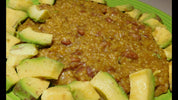
How to Make Haitian Mayi Moulen: Traditional Cornmeal Dish in 2025
, by Seo Guy , 5 min reading time

, by Seo Guy , 5 min reading time
Corn has always been a cornerstone of Haitian agriculture, and Mayi Moulen, a comforting cornmeal dish, is one of the most enduring ways it is prepared. Comparable in texture to polenta or grits, Mayi Moulen is uniquely Haitian thanks to the flavors, accompaniments, and cultural rituals that surround it. This dish represents nourishment, simplicity, and resilience, reminding Haitians of their history while offering comfort at the family table.
In 2025, Mayi Moulen continues to be a daily favorite in Haitian households. It is prepared in both rural and urban kitchens, served plain as a breakfast staple or elevated with beans, vegetables, fish, or herring for more festive meals. Its versatility and deep cultural meaning have kept it at the heart of Haitian cooking for generations.
Mayi Moulen is essentially ground cornmeal cooked slowly until it becomes soft, creamy, and hearty. But unlike Italian polenta or American grits, it is infused with Haitian seasonings such as garlic, scallions, thyme, and epis (a blended herb seasoning paste that is central to Haitian cuisine). The dish often incorporates red beans or black beans for additional flavor and protein, creating a filling, nutrient-rich meal.
In many households, Mayi Moulen is paired with fish, herring sauce, or fried eggs. The combination of creamy cornmeal with savory toppings makes it satisfying and adaptable. Whether served as a quick weekday breakfast or as part of a larger Sunday brunch, Mayi Moulen is a dish that comforts while reflecting the creativity of Haitian cooking.
The preparation of Mayi Moulen begins with boiling water seasoned with salt, garlic, onions, and sometimes butter or oil. Cornmeal is added gradually to prevent lumps, then stirred constantly until it thickens into a smooth, porridge-like texture. Beans are often cooked separately and folded into the dish, giving it richness and variety.
A popular variation is Mayi Moulen ak sòs pwa, where the cornmeal is served with bean sauce, usually made from pureed black beans or red kidney beans. This combination is deeply rooted in Haitian food culture and highlights the importance of beans as a staple ingredient. Families often serve Mayi Moulen in large bowls at the center of the table, reinforcing its role as a communal dish.
Mayi Moulen is often eaten at breakfast, sometimes topped with fried eggs or slices of avocado. For lunch or dinner, it is paired with fried fish, salted herring, or vegetable stews. In rural areas, it remains one of the most affordable and accessible dishes, a reflection of Haiti’s reliance on corn as a staple crop. For Haitians abroad, Mayi Moulen is a nostalgic dish, one that instantly transports them back to family kitchens and childhood memories.
The simplicity of Mayi Moulen also makes it one of the first dishes many children learn to cook. Its ingredients are basic, the technique straightforward, yet the flavor is deeply comforting. It represents the idea that Haitian food does not need to be elaborate to be meaningful—it is about making the most of humble ingredients with care and creativity.
Beyond its role as a staple dish, Mayi Moulen carries cultural significance. It represents resilience and resourcefulness, showing how Haitians have turned simple crops like corn into nourishing, flavorful meals. For the diaspora, Mayi Moulen symbolizes home and heritage. Eating or cooking it becomes an act of cultural preservation, especially when paired with traditional toppings like sòs pwa or salted fish.
The dish also reflects Haiti’s agrarian roots. Corn remains one of the most widely grown crops in the country, and Mayi Moulen highlights the connection between the land and the table. It is a reminder of both struggle and survival, as well as joy and celebration.
In recent years, Haitian chefs have introduced Mayi Moulen to international audiences, often presenting it as “Haitian polenta” to make it more accessible. Food festivals and restaurants have begun to highlight it alongside more famous dishes like Diri Djon Djon and Soup Joumou. Its simplicity and adaptability make it a perfect ambassador for Haitian food culture. In 2025, it continues to grow in recognition as diners search for authentic and comforting global flavors.
Like many Haitian dishes, Mayi Moulen is often passed down through oral tradition rather than written recipes. Each family has its own method—some prefer it thicker, others creamier. Some always pair it with sòs pwa, while others reserve beans for special occasions. These variations show how Haitian cooking is both communal and personal, shaped by family history and regional traditions.
For Haitians in the diaspora, teaching children to cook Mayi Moulen ensures that cultural identity remains intact. The dish becomes a bridge between generations, connecting grandparents and grandchildren through shared meals and memories.
In a fast-paced, globalized food culture, Mayi Moulen stands out as a dish that values simplicity, history, and community. It reminds Haitians of their roots, while inviting others to appreciate the beauty of humble ingredients elevated through tradition. In 2025, its growing recognition on the global stage highlights the richness of Haitian cuisine and the resilience of its people.
Cooking and eating Mayi Moulen is a cultural act, but pride in heritage doesn’t end with food. Visit CreoleSizzle.com to bring Haitian identity into your daily life. From kitchenware inspired by traditional cooking to apparel that celebrates cultural pride, CreoleSizzle helps you carry the spirit of Mayi Moulen and Haitian resilience with you every day.